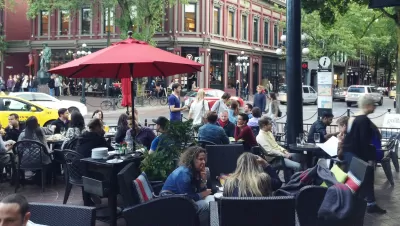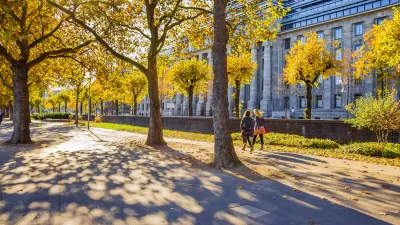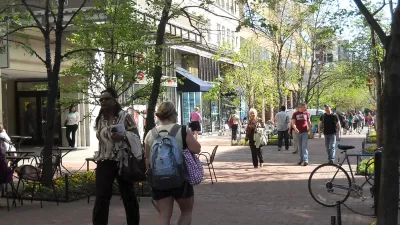As the pandemic emphasized, the way we design our cities can have lasting impacts on residents' health and wellness.

In Governing, Alan Ehrenhalt highlights the link between urban design and public health, pointing to arguments by public health experts that the way we design cities and buildings has a powerful impact on the health of individuals and populations.
A fair amount of public health by design has to do with re-engineering temperature, especially making the environment cooler in abnormally hot times and places. Reducing the amount of blacktop pavement is one way to do this; too much blacktop creates a heat trap. Protecting tree cover is one more; ample tree cover has been shown to reduce the prevalence of asthma in large cities.
As another example, walkability affects people's ability to get regular exercise by walking to work, school, or local amenities. Meanwhile, polluted air can counteract the positive effects of good sidewalks and crosswalks by contributing to the prevalence of lung and respiratory diseases.
Ehrenhalt provides other examples of design choices that impact public health, including stairways, ventilation, and open-air plazas. But while he supports the concept, Ehrenhalt cautions that "Adding health impact studies, in addition to forcing predictions that are difficult to make in the long run, would add significantly to the red-tape problem." Nevertheless, the public health lessons of the past century can inform design decisions that create healthier cities.
FULL STORY: Is the Design of Our Cities Making Us Sick?

Planetizen Federal Action Tracker
A weekly monitor of how Trump’s orders and actions are impacting planners and planning in America.

DARTSpace Platform Streamlines Dallas TOD Application Process
The Dallas transit agency hopes a shorter permitting timeline will boost transit-oriented development around rail stations.

Congressman Proposes Bill to Rename DC Metro “Trump Train”
The Make Autorail Great Again Act would withhold federal funding to the system until the Washington Metropolitan Area Transit Authority (WMATA), rebrands as the Washington Metropolitan Authority for Greater Access (WMAGA).

Supreme Court Ruling in Pipeline Case Guts Federal Environmental Law
The decision limits the scope of a federal law that mandates extensive environmental impact reviews of energy, infrastructure, and transportation projects.

Texas State Bills to Defund Dallas Transit Die
DART would have seen a 30% service cut, $230M annual losses had the bills survived.

Bikeshare for the Win: Team Pedals to London Cricket Match, Beats Rivals Stuck in Traffic
While their opponents sat in gridlock, England's national cricket team hopped Lime bikes, riding to a 3-0 victory.
Urban Design for Planners 1: Software Tools
This six-course series explores essential urban design concepts using open source software and equips planners with the tools they need to participate fully in the urban design process.
Planning for Universal Design
Learn the tools for implementing Universal Design in planning regulations.
Roanoke Valley-Alleghany Regional Commission
City of Mt Shasta
City of Camden Redevelopment Agency
City of Astoria
Transportation Research & Education Center (TREC) at Portland State University
US High Speed Rail Association
City of Camden Redevelopment Agency
Municipality of Princeton (NJ)





























